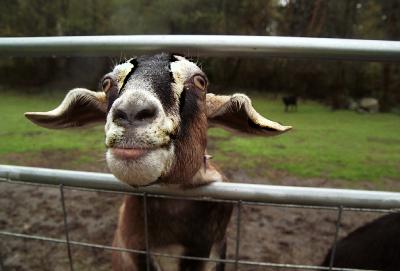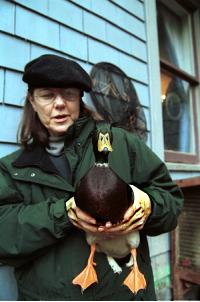
|
| Welcome to the Baahaus: Staffer cares for neglected
animals Thursday, November 20, 2003 |
Glenda Pearson lives with a cow named Cathy, and a couple of house pigs called Annie and Lewis, and some hogs named Hazel and Ruby, not to mention assorted rabbits ducks, llamas, geese and more pigs. In fact, Pearson lives with about 125 animals and one human on a Vashon Island farm.
Photo by Kathy Sauber
Glenda Pearson holds Buckley, a wild mallard who lives at Baahaus by choice. But this isn’t just any farm. Most of the animals that Pearson and her partner Karen Eliasen care for have been abused or neglected and aren’t the type of animals the average family would want as pets.
“Vashon Island has a terrific group called Vashon Island Pet Protectors that concentrates on dogs and cats,” Pearson says. “It has a horse association that concentrates on equines. We take in animals in the ‘other’ category.”
They call the place Baahaus — or more formally, Baahaus Animal Rescue Group. It’s a whimsical name that suits the spirit of the place where you’ll find, for example, three piglets named LaVerne, Maxine and Patty. (Anybody remember the Andrews Sisters?)
Pearson, who runs the microform and newspaper collection at Suzzallo Library and is the comparative literature, cinema studies and human rights librarian, has been an animal lover all her life, but she didn’t begin animal rescue work until she and Eliasen moved to the 6 acres they own on Vashon in 1994.
“We had a couple of farm animal pets and had taken in some strays,” Pearson recalls. “Some friends who had done very well in the dot-com world saw what we were doing and told us we should run an animal rescue operation, that they would help support it.”
So, in 1997, Pearson and her partner started the five-year process to become an official nonprofit organization in the eyes of the IRS. “You have to prove your viability to the feds and document your finances; accounting is definitely not my strong suit,” she says.
Since then the dot-com friends have lost their wealth, but Baahaus has attracted donations and volunteers and has continued to grow. It gained permanent 501c(3) status in 2002, and Pearson notes that although the Combined Fund Drive doesn’t list it, it is possible to give to Baahaus by writing it in on the donation form.
What is it like to have all those animals to care for and a day job besides? A lot of work, Pearson says. She’s up each morning at 4:30, tending to her daily chores. On the weekend there is perhaps 10 or 12 hours worth of heavier work like shoveling manure. And although volunteers help out, the responsibility is constant. Two years ago, Pearson and Eliasen took their first vacation in 10 years.
But as far as Pearson is concerned, there’s no question that it’s all worth it. The animals, she claims, all have distinct personalities, which is why they all have names. It’s also why she considers her biggest duty is interacting with them.
“You can blast through and throw hay over the fence and make sure they have water and rush off to work, but that just seems sort of prison like,” Pearson says. “So we do a lot of social interaction with them and we have several volunteers who are great about coming out and sitting with the pigs and talking with them and rubbing their bellies. It’s invaluable, better than a monetary donation.”
Baahaus also encourages the animals to get along with each other, which can sometimes be a challenge. Teaching the dogs not to run after the chickens takes time, for example, and the 17 roosters can’t all be housed together because they’d fight. But Pearson says that by observing the animals closely, it’s possible to see which ones are potential buddies, and that animals — just like humans — can learn to resolve their differences over time.
Take Annie and Lewis, the pot-bellied pigs, for example. Annie had been a house pig at Baahaus for six or seven years, sleeping in the laundry room and going out in the side yard by herself because she didn’t want to be with the other nine outdoor minipigs. Then Lewis arrived, and he couldn’t be with the other pigs, either, so he was placed with Annie. It was a relationship made in hell, Pearson says. Lewis had actually worked in the King County Sheriff Department’s DARE Program, whereas Annie had a police record for home invasion in Lynnwood — really.
“They hated each other,” Pearson says. “They each spent the summer pretending the other wasn’t there, no small feat since they both weigh over 150 pounds.”
But then the weather cooled off, and Lewis learned to climb the special stairs into the house.
“He discovered the joys of sleeping in the laundry room,” Pearson says with a laugh. “He learned that if he just stopped pestering Annie, he could be in there in her big wad of blankets. And now they’re like some old married couple; they just get along great.”
Which is pretty much how it goes at Baahaus, Pearson says. “For the most part, it’s almost as if these animals figure out that they’ve come to a place where they’re going to be cared for and all they have to do is get along with one another, and they find some way to do that.”
Getting along is all that Pearson and her partner ask of the animals. They “get a little bristly” about the idea of petting zoos, saying most of the Baahaus animals have been mistreated in the past and need to be left alone. An open house once a year for their contributors is the only time visitors other than their small band of volunteers are invited to the farm.
Baahaus couldn’t exist without its contributors. Pearson estimates the budget for animal care at about $20,000 a year, and that doesn’t include the costs of a major rescue, if they have one. Animals are referred to Baahaus through a variety of means, and Pearson says they haven’t turned one down yet. So, although they neuter all their animals to prevent breeding, they’re approaching capacity.
“What we’re really hoping is that we would encourage other people who have some acreage and have some interest in animals to do this sort of thing,” Pearson says. “If anybody in Pierce County could do it, that’s where they really need help right now.”
Meanwhile, Pearson will carry on at Baahaus, which she says gives her an opportunity to do some good in a very direct way. “If all I’m doing is helping one goat that’s been beaten with a 2 by 4 to get out of that situation and have a nice place to live, then that’s something,” she says. “We took in nine pigs that were so traumatized they would just run and hide. Now they like me, and not just because I feed them. We sit out there and discuss the concerns of the world, and they grunt and shake their heads at the stupidity of mankind. Knowing I can do something for them, that’s the reward.”
You can visit Baahaus through its Web site, http://www.baahaus.org/.


